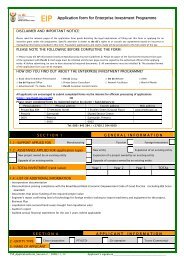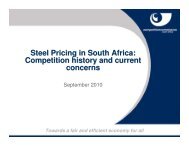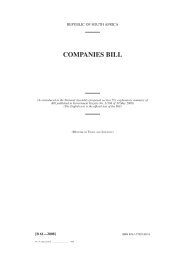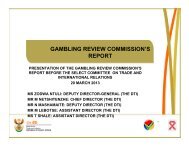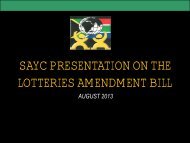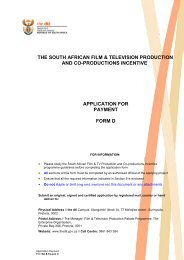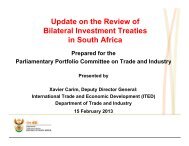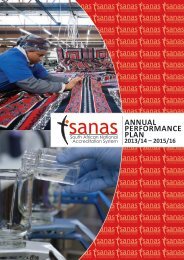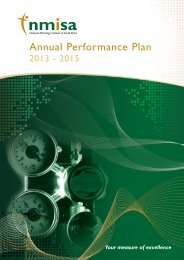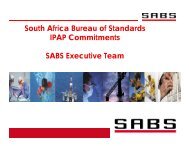Copyright Review Commission Report - ICT Law and Regulation ...
Copyright Review Commission Report - ICT Law and Regulation ...
Copyright Review Commission Report - ICT Law and Regulation ...
- No tags were found...
Create successful ePaper yourself
Turn your PDF publications into a flip-book with our unique Google optimized e-Paper software.
The environment in which the music industry operates is influenced by a number of government departments in additionto DACST:The Department of Trade <strong>and</strong> Industry (DTI) is responsible for the copyright legislation that governs the culturalindustries <strong>and</strong> for creating the conditions, including incentive packages <strong>and</strong> export support, that facilitate thegrowth of these industries.The Department of Labour (DoL) is responsible for the legislation regarding human resource development in thecultural industries, most notably the Sector Education <strong>and</strong> Training Authorities (SETAs), as well as for thelegislation that governs labour relations.The Department of Education (DoE) is responsible for the provision of in-school music education.The Department of Home Affairs is responsible for the issuing of work permits in the cultural industries.The Department of Communications (DoC), <strong>and</strong> the Independent Broadcasting Authority 4 (IBA) in particular, areresponsible for local content regulations that impact on the music industry.In addition to government, the well-being of the music industry is affected by the record companies, the collectingsocieties, the unions, relevent NGOs, the state of live music, <strong>and</strong> so on.The recommendations of the MITT are made to the Minister of Arts, Culture, Science <strong>and</strong> Technology (hereafter referedto as “the Minister”), but fall within the domain of all of the above-mentioned ministries <strong>and</strong> stakeholders. The MITTrecognises that the Minister therefore cannot directly implement all of its recommendations. He can play an importantrole in encouraging his colleagues <strong>and</strong> the stakeholders in the industry to cooperate in strategies that will enhance thedevelopment of South African music.Based on the written <strong>and</strong> oral submissions, the MITT identified the major problems in the music industry as follows: Inadequate <strong>and</strong> outdated copyright legislation, particularly with regard to needletime. Widespread piracy <strong>and</strong> copyright infringement that disables the growth of the local music industry. The ineffectiveness of the IBA's local content monitoring system <strong>and</strong> the low levels of local content in the media. The prevalence of unfair contracts - historic <strong>and</strong> current - leading to a polarised <strong>and</strong> hostile industrial relationsenvironment. A legacy of disempowerment <strong>and</strong> lack of access to education, training <strong>and</strong> information about the economics of theindustry among musicians <strong>and</strong> related workers, coupled with a lack of transparency <strong>and</strong> accountability of keyplayers within the industry. An imbalance in power relations in the industry that negatively impacts on its growth - in particular, the inadequatedefinition of musicians’ status as workers in labour legislation which undermines their access to legal protection<strong>and</strong> other benefits. Widespread experience of ongoing racism <strong>and</strong> sexism within the industry. The isolation of aspirant musicians living outside of Gauteng. Inadequate funding for music development.3.RECOMMENDATIONS4 The Independent Broadacst Association IBA has now been joined with the South Afrcan Telecommunications Authority (SATRA) toform Independent Communications Authority of South Africa (ICASA)- 168 -



